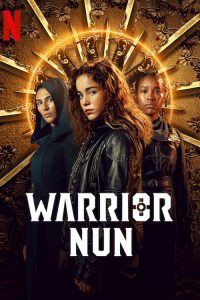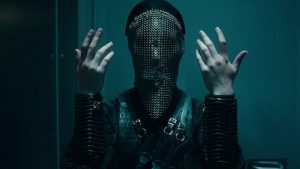What I’m Watching: “Warrior Nun”
 Initially, I thought a series titled Warrior Nun had to be a spoof, but I quickly found out my error with an action-packed, high drama opening. I’ll confess, too, that I was a tad doubtful even so, but overall I ended enjoying the first season of the Netflix series, Warrior Nun, which is set in Spain (with use of some spectacular landscapes and built-heritage settings.)
Initially, I thought a series titled Warrior Nun had to be a spoof, but I quickly found out my error with an action-packed, high drama opening. I’ll confess, too, that I was a tad doubtful even so, but overall I ended enjoying the first season of the Netflix series, Warrior Nun, which is set in Spain (with use of some spectacular landscapes and built-heritage settings.)
Here’s the premise: Ava, a recently deceased, tetraplegic orphan has a supernatural halo thrust into her body during a firefight between mercenaries and a secret order of demon-fighting, warrior nuns. The halo not only resurrects Ava but restores her to full health. Subsequently, she learns that the halo not only gives the bearer superpowers but denotes the military leader of the warrior nun order. Ava, however, in the best epic hero tradition, is by no means sure she wants to embrace the destiny the halo implies and become a demon-fighting nun, warrior or not. As the story progresses, she — and the viewer — learn there’s a tech company (ArqTech) bent on constructing a portal into alternate dimensions and competing for the same magic metal that powers the halo and the warrior nun’s weapons, chiefly the “cruciform sword.”

The first season (so far there’s only one season) charts Ava’s initial delight in her newfound health, through growing awareness of the dangers the halo presents, and gradual drawing-in to the business of both the warrior nuns, i.e. the Order of the Cruciform Sword, and ArqTech.
So far, you may think, so traditional superhero/epic hero fare — which it is! As you may know, especially if you’ve read my Having Fun With Epic Fantasy Tropes post series, there are a lot of epic traditions to draw upon and Warrior Nun does not stint itself in this respect. But as I also mentioned in the Having Fun series, the tropes are “part of what I love” about epic and fantasy, so although I may have done a little finger-tapping over Ava going full-throttle on the whole “refusing the call” arc, overall I was never not going to enjoy a series with its foundations firmly in the epic/superhero tradition.

Secret Order
You may also be wondering how the series dealt with the whole Roman Catholic Church and organised religion aspect implicit to an order of warrior nuns. I began with quite a few questions over that myself and also suspect that the show may not entirely appeal to the ardent among either churchgoers or sceptics. On the one hand, the order, however demon-fighty, are nuns and part of the church. On the other, the church and the order are clearly shown as institutions where politics and power clearly hold sway and engender all the attendant abuses. Similarly the show touched on the question of corporate power and the abuses attendant on the quest for knowledge and technical advantage in that sphere, similar to a show such as Orphan Black, although it was not as major a part of the Warrior Nun storyline.
Overall, I thought the show trod the line between belief and scepticism reasonably adeptly; most importantly, as a viewer one did not have to “believe” in a religious sense to enjoy the story, although obviously any tale that has superheroes and demon-fighting as its premise requires suspension of disbelief.

Mary & Lilith, out & about
What I found more difficult was the backstory of the first halo bearer, who was famous for fighting “barbarians.” The crusading garb of the first bearer, the appearance of her antagonists, and the history of Spain, suggest a Christians versus Moors conflict, tying it visually to the show’s more supernatural “good versus evil.” Although, arguably, these flashbacks may be part of the “myth” of the halo, I still considered it unfortunate, because the “good” and “evil” of such historical conflicts frequently depend on one’s side in it, and factually reside in the atrocities and tyrannies committed. Arguably, the Moorish civilization was for a long period considerably more advanced than that of Dark and Middle Ages Europe — and while the Crusades had more than their share of atrocities, the later Inquisition was a centuries-long institutionalization of cruelty, terror, and repression.
I believe it would have been better therefore, to ground the mythos of the backstory, as well as the present action of the show, in the realm of the fantastic.
This being said, however, there were still many reasons I enjoyed Warrior Nun overall:

Yep, she *is* a Chosen Hero…
The storyline had depth and all the characters, particularly the “sidekicks” felt well-fleshed out. I liked Ava, the central character, and thought she comprised a nice mix of teen coming-of-age, especially restored to life-and-health coming-of-age, and reluctance to accept the halo-bearing and demon-slaying calling, especially coupled with becoming a nun.
I really liked several of the supporting characters, such as (Shotgun) Mary who was a central character in her own right rather than just a “sidekick”, as was Beatrice, another of the warrior Sisters. And one of the outstanding strengths of the show for me was the bonds of friendship and “band of sisters” loyalty between the women characters.
Also, the “band of sisters” were totally kickass and the action sequences were really good. And yes, I believe the show well and truly passed the Bechtel test.

There are definite badass moments…
I do have some quibbles, such as nuns stalking about in broad daylight carrying swords with (apparently) no questions asked, as well Ava acquiring instant youth-culture panache despite having spent most of her life a tetraplegic in a convent-run orphanage. Ostensibly, she watched a lot of TV—except the orphanage was presented as cash-strapped and spartan, so that didn’t really wash in terms of either the panache or the ability to set a broken leg. I felt a little more care could have overcome these infelicities, but they were still very minor moments in terms of the overall flow of the story.

… plus moments of action cool
Overall, I believe fans of the Buffy and Angel ‘verse, and viewing such as Orphan Black, Constantine, and The Old Guard, with a little Da Vinci Code thrown in, will likely enjoy Warrior Nun as well. And if you’re into kickass women warriors who more than hold their own in the superhero pantheon, along with band-of-sisters’ comradeship-in-arms, then I recommend giving Warrior Nun a go.

The bonds of sisterhood define the show








I loved the aesthetics of this series. Especially the nuns costumes. It all just added to the fun for me
You’re right! It does have a great aesthetic and was mostly a lot of fun. 🙂
Ha Sean loved it too. I have only watched a few minutes so far. Will have another look. Off this topic and onto another, I have dug out my boxes of books marked Scifi etc and now with study behind me I have time to read. Dipping into a few old favourites before I do a Marie Kondo on them. I went for a spin on Nivens’s Ringworld last weekend and I am revisiting The Man in the Maze by Robert Silverberg this week. Which I first read in my teens and not since till I found a dog eared paperback a few years ago. I might reread the two volumes of The women of Wonder anthologies of women writers in Scifi again next. Can you tell it’s nostalgia month here at our house?
I think you might find something to like, Jacqui.
And nothing wrong with reading nostalgia — I like to keep a balance between older and newer works. 🙂
I enjoyed it. Had to get past some super-cheesy teen elements early on but once into the swing I found characters well done, scenery lovely and tempo good. I especially loved Beatrice, and found the plot unpacking at the end to be twisty enough to thoroughly enjoy. I thought the portrayal of the catholic church quite clever, a deeply rooted institution with a mix of amazing people with compassion who want to do the right thing mixed with seekers of power and willing to cross lines to get it. any group of humans probably heads this way over time.
I, too, really liked the way Beatrice’s character evolved. And the settings were fabulous: one day, post Covid, I would love to check some of them out.